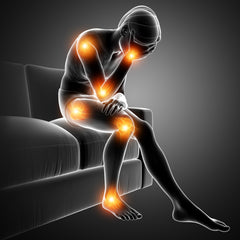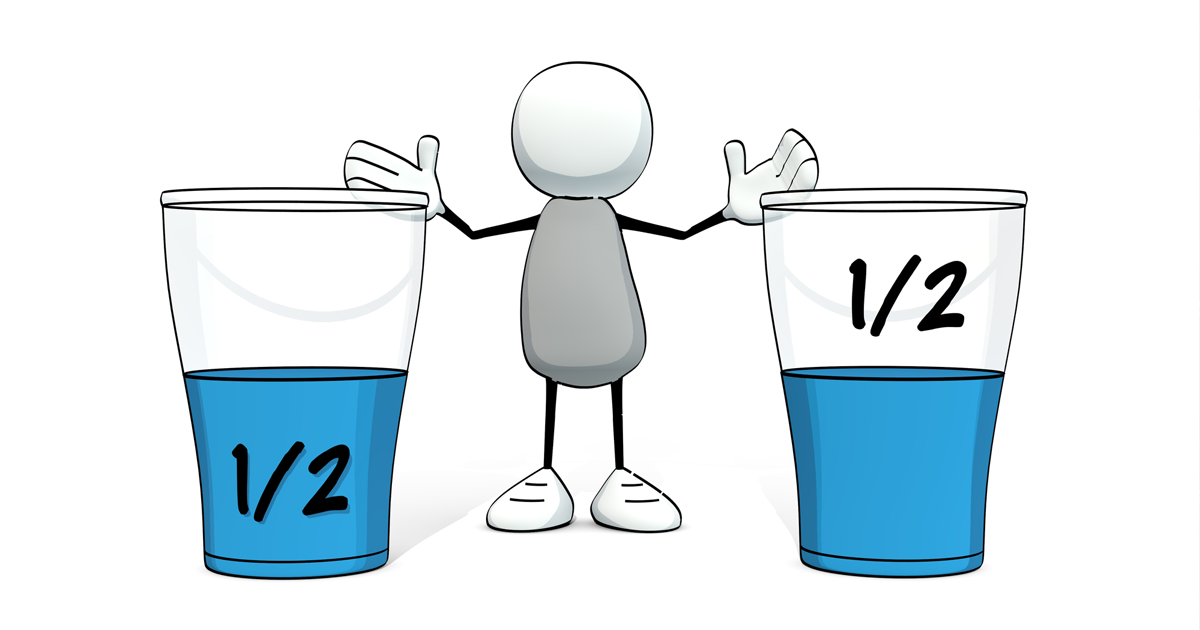There is no an product in your account
please add some product to cart.
What You Need To Know About Your Attitude And Recovery
Posted by John Coppola on 08 Aug, 18
Are you a glass-half-full or a glass-half-empty kind of person? Highly respected Johns Hopkins researchers have found that your stance on this view can make a difference in your health and recovery from chronic illnesses.
Do you think it’s far-fetched that the power of your thoughts and emotions could create physiological changes? Think again. There are countless examples, both scientific and anecdotal, proving this theory. Allow me to give you one very basic example in which we all can relate...
Remember when you had to give a very important presentation to a group of people? Or maybe you were simply preparing to meet your significant others family for the first time. Did you experience ‘butterflies’ in your stomach? How about heart palpitations? Did your blood pressure rise? These are all typical reactions that any of us will experience, and they’re all physiological changes the body goes through in response to an emotion. That emotion might be fear, anxiety, excitement, apprehension, anger, and so on...
Positive or Negative Attitude Impacts Illness Recovery

There are basically two kinds of people: Positive Thinkers and Negative Thinkers. Did you know that negative thinkers tend to have more health problems than those who think positively? Not only can positive thinking make you healthier, but it can, actually, help you recover faster and experience a better life.
Positive thinking isn’t about looking at the world through ‘Rose-colored’ glasses. It’s about tackling the challenges life throws at you with a positive attitude. Instead of moaning, groaning, complaining and worrying about a challenge, positive thinkers will approach a problem with the attitude of “how can I make the best of this situation?
A Positive thinker is very realistic, while finding ways to make the best of a bad situation.
Your Attitude Influences Your Immune System

Your mind strongly manipulates the state of your immune system. For example, psychological stress impacts the immune system negatively by suppressing it. In fact, researchers at Carnegie Mellon University reported that study participants who were placed under stress were twice as likely to get sick..
So how does this affect conditions like Peripheral Neuropathy, Cancer, Heart disease and autoimmune disorders? Negative thoughts increase the stress response in the body, resulting in increased cortisol levels. Chronically elevated cortisol leads to inflammation. Over time, with the repetitive negative thoughts and emotions inflammation levels can get out of control.
It’s a well-known scientific fact that Inflammation plays a role in many diseases ranging from peripheral neuropathy to heart disease, asthma, autoimmune diseases and cancer. A research article published in the Proceedings of the National Academy of Sciences, shows how psychological stress can interfere with the body’s ability to regulate inflammation, thereby, promoting disease progression. Researchers suspect that people who are more positive may be better protected against the inflammatory damage of stress.
Doctors now acknowledge that negative thoughts, emotions and attitudes worsen any illness and lead to major recovery setbacks. Dr. Ravinder Mamtani (a specialist in occupational and general preventive medicine, public health and integrative medicine) states, “There is now evidence that hopelessness accelerates a myriad of diseases and increases mortality. There’s scientific proof that negative thinking makes life worse, leads to greater struggle and shortens your life span. So, get rid of negative thinking today and fill your mind with positive thinking and attitude”.
Negativity and Pain
A study published in 1990 found that negative thoughts increased pain levels and chronicity.
According to the Mayo Clinic, habitual negative thinking wreaks havoc on your body and can possibly result in:

Physical Symptoms:
- Muscle tension and spasm
- Increased pain levels
- Headaches
- Chest pains
- Reduction in sex drive
- Sleep problems and insomnia
- Digestive problems
- Fatigue
Emotional Symptoms:
- Mood changes
- Anxiety
- Restlessness
- Irritability and anger
- Depression or sadness
- Lack of focus and motivation
Benefits of Positive Thinking

There are a surprising number of benefits offered by positive thinking, and you’d be amazed by how positivity can affect your health for the better!
Increases Pain Tolerance
In a study published in Science Direct, positive thinking was proven to help people tolerate pain better. In fact, science has revealed negativity can cause more intense pain sensations with anincreased duration, in comparison to a positive thinker.
Boosts Immunity
Positive thinking helps to fight stress, thereby taking a load off your immune system. In fact, positive thinking has been found to boost your body’s ability to fight off disease.
Improves Heart Health
Positivity can lower your risk of heart disease, including stroke and heart attacks. Positive thinking has even been shown to lower blood pressure in people diagnosed with hypertension. People who think positively tend to exercise more, eat healthier, and live happier lives!
Combat Stress
Not only are there major health problems caused by stress, but nearly every disease and disorder are made worse by anxiety and stress. Positive thinking can help manage stress, thereby preventing a wide range of health problems!
Extends Lifespan
A study conducted at the University of London found that seniors who thought positively tend to age healthier. They suffered from fewer physical and emotional health problems as they got older and, even had a longer life expectancy than their negative counterparts! The reality is that positive thinking is one of the best things you can do for not just your physical health, but your emotional health as well!
How To Boost Your Bright Side?
Smile! Smile! Smile.

A University of Kansas study found that smiling—even fake smiling—reduces heart rate and blood pressure during stressful situations. So try a few minutes of watching your favorite animal video on YouTube or an episode of ‘Americas Funniest Videos’ (AFV). Humor therapy is the best way to turn those feelings of anger, fear or frustration into feelings of love and peace. After all, this will help lower your pain levels.
Live Every Day With An Attitude Of Gratitude

- Are you angry, sad or resentful because of the insufferable pain you have in your legs. Remember, at least you still have 2 legs that can possibly be healed (unlikemany wounded warriors). Maybe you haven’t found the solution yet, but that doesn’t mean it’s not out there.
- Instead of stressing about traffic, appreciate the fact that you have a car. Use the extra time to listen to happy music or a positive audio book, accepting that there is absolutely nothing you can do about the traffic.
- Create a gratitude journal and record ALL the things (great and small) that you are grateful for. It may be something as small as being grateful that your special ‘fur baby’ is curled up next to you giving you love. When your pain levels increase, go back and read this journal. It will allow you to remove the focus off your pain.
Redirect Your Thoughts

Breaking negative thought patterns can be difficult, initially. First begin by observing your thoughts. When you find that they’ve become negative, judgmental or your stuck in a complaining loop...Stop!
Take a moment to counter these thoughts with 2 positive observations or things to be grateful for. With time and practice, this will become very natural and the negative thoughts will transition to more positive thoughts, automatically.
For more articles on health and wellness, visit us at: Heal My Nerves
 This blog has been provided by Dr. John Coppola, D.C. and Dr. Valerie Monteiro, D.C. Dr. Coppola and Dr. Monteiro are the founders of the San Antonio Neuropathy Center, and Precision Sport & Spine. They are the leading experts in the field of neuropathy and specifically drug free nerve repair. They are the authors of the critically acclaimed book "Defeat Neuropathy Now .... In Spite of Your Doctor. The doctors have over 25 years of clinical experience.
This blog has been provided by Dr. John Coppola, D.C. and Dr. Valerie Monteiro, D.C. Dr. Coppola and Dr. Monteiro are the founders of the San Antonio Neuropathy Center, and Precision Sport & Spine. They are the leading experts in the field of neuropathy and specifically drug free nerve repair. They are the authors of the critically acclaimed book "Defeat Neuropathy Now .... In Spite of Your Doctor. The doctors have over 25 years of clinical experience.
If you would like to reach the doctors regarding a specific health problem, you may email them at info@bodiesrebuilt.com.
Popular Article
Do You Need to Smoke Marijuana for Controlling Pain?
The Miracle of Castor Oil Pack
Science Confirms Infrared Light Therapy Remarkable for Healing Nerves
What You Need To Know About Your Attitude And Recovery
Secret Benefits of Honey for Wound Healing
Do These Simple 10 Minute Exercises to Lower Your Nerve Pain





